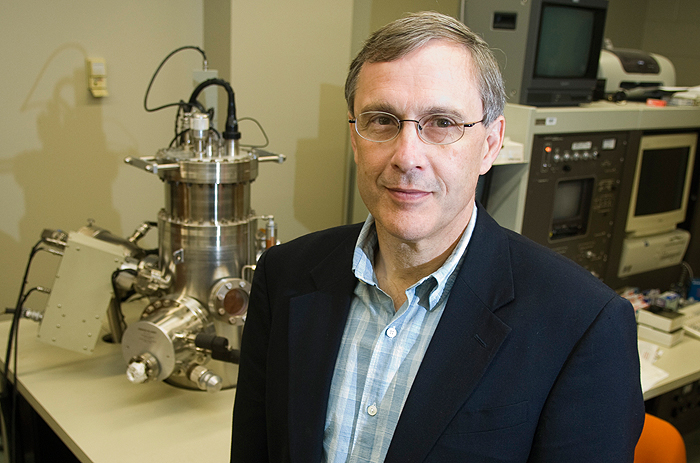
Steven L. Suib, Board of Trustees Distinguished Professor of Chemistry, is the 2011 winner of the Connecticut Medal of Science.
Suib, whose work in solid state chemistry and the synthesis of novel materials has a strong environmental focus, was chosen for his “outstanding impact on the field of catalysis and materials science over the past 30 years.”
He has collaborated closely with a host of Connecticut companies, including Pratt & Whitney, which funds research and a laboratory at UConn for studying fiber composites used in engine parts, and VeruTEK, for which Suib’s research team makes catalysts used in pollution prevention and water and soil remediation.
His research has also aided companies looking for catalysts for upgrading fuel and those developing fuel cells.
Suib has supervised more than 100 Ph.D. students, nearly 50 of whom now hold research positions in Connecticut industries.
He has been designated a “Chemical Pioneer” by the American Institute of Chemists for outstanding contributions with major impact on advances in chemical science and industry, and was inducted into the Connecticut Academy of Arts and Sciences in 2008.
His research has attracted major federal funding from the Department of Energy and the National Science Foundation. He is a lead researcher working with others at UConn on a five-year, $1.8 million DOE grant to make catalysts for and scale up a biomass conversion plant that will be built at UConn. The goal is to develop new biofuel sources suitable for the Northeast.
Suib, who came to UConn in 1980, has been the department head of chemistry in the College of Liberal Arts and Sciences for 10 years. This spring he won a 2011 CLAS Research Excellence Award. In presenting it, Dean Jeremy Teitelbaum said that Suib’s heavy commitment to research is particularly noteworthy, considering his added role in leading one of the largest, most complex departments on campus.
Suib is the third UConn scientist, all of them CLAS faculty members, to win the Connecticut Medal of Science. Robert Birge, The Harold S. Schwenk Sr. Distinguished Chair in Chemistry, won the medal in 2009. William Stwalley, Board of Trustees Distinguished Professor of Physics, won it in 2005.
Suib’s work on solid materials – catalysts, polymers, ceramics, and semi-conductors – involves research into how to control their properties. He also studies how to control the size and shape of holes in porous materials and nano-particles. The goal is to make the chemical process or the final material “greener.”
A central question in his research is, “Can we make materials that no one else has made, using relatively simple materials?”
He holds 50 patents and has published more than 450 research papers. His first patent involved the use of microwave energy to convert natural gas into gasoline.
Suib earned his Ph.D. at the University of Illinois at Urbana-Champaign after attending college at the State University College of New York at Fredonia, where he majored in chemistry and geology. His father was an entomologist, and his grandfather was an immigrant artist from Lithuania who had patents on materials that could be used in sculptures and paintings.
He recalls being mentored by outstanding chemistry teachers in high school, who gave him an opportunity to work as a lab assistant.
“My high school chemistry teacher Nora Keyser inspired me to pursue studying chemistry,” he says.
Asked by the Connecticut Academy of Science and Engineering how he would like to be known, Suib wrote: “I’d like to be remembered in the field of science as someone who was interested in many different areas, as someone who carried out research in a fundamental way to try to solve practical problems, and as someone who has collaborated effectively with a variety of academic, industrial, and government researchers to help improve our global situation.”
CASE is one of the sponsors of the Connecticut Medal of Science, along with the Board of Governors of Higher Education.
Suib will receive his medal on May 25 in Norwalk.


